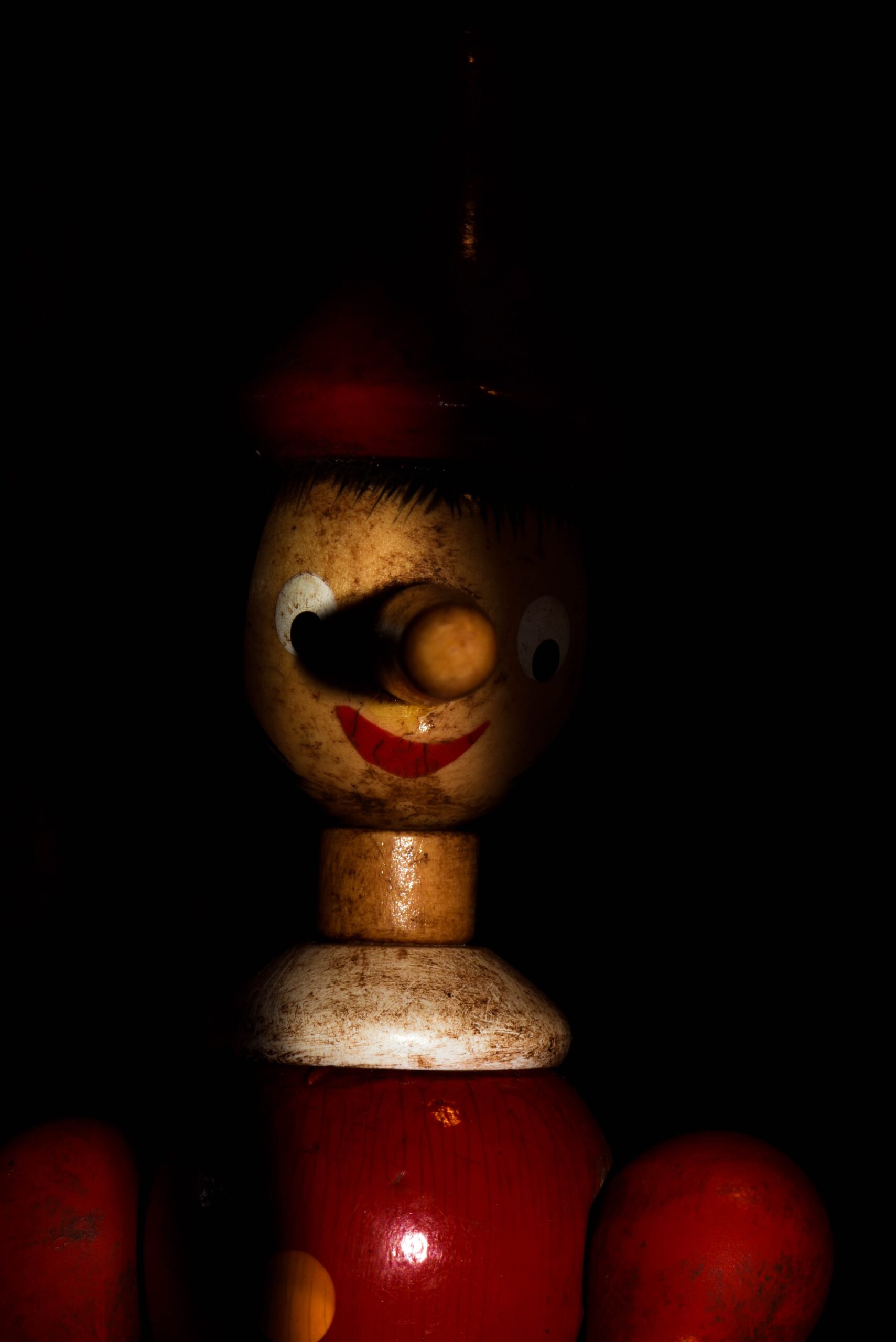Geppetto makes his doll from bones, from chicken legs and foxes’ ribs, a pig’s left shoulder, and the skull of an owl. He binds them together with catgut, then laces them tight and gets to work on miniature clothes. There are corded breeches, a harlequin shirt, a felted green hat, a yellow cape lined with fur. His clocks tick in unison as he finishes the oyster shell shoes. They clatter and clack when the doll walks, each foot marking time with the ticking clocks.
Geppetto’s doll beckons from invisible strings. To the fox-masked revelers, to the jugglers and montebancs, to the hawkers of partridge and salt and the garlic vendors. To the sickly boy who stops and points, to his sister who tugs at his arm to go. The boy coughs up coppery phlegm, and the girl tugs harder. She’s heard all about the queer old clockmaker and his mechanical toys, about the children he eats, about the clocks he makes from their bones. She tries not to watch as the doll kicks its legs and doffs its hat. It does a funny bow until the boy claps and laughs. His sister smacks his head and tells him to keep walking. Cats wind round his legs, almost tripping him. There are always cats around the clockmaker’s shop.
They make their camp on a windswept hill overlooking the town. It lies awake with festivities, alight with fire spinners and magicians and dancers in scarlet robes. A haze of burnt sugar and frying fat hangs in the air, and the girl talks of the sweets they’ll buy as they crouch by their meager fire. There they share what they’ve collected. The girl found coins and hatpins, a tortoiseshell comb, and best of all, a trio of eggs. They haven’t eaten all day. The boy produces some worthless buttons, an owl’s feather, and two marbles he’d found in the gutter. As the sister cooks the eggs, the boy coughs and shivers and rolls the marbles around in his hand. They glint in the firelight like feral, hungry eyes.
The town’s still waking when she leaves him by the stone wall that separates the boneyard from the main thoroughfare. Wait here while I find some food, she tells him. You can watch the parade. The boy smiles at this, and when she’s out of sight, he begins to climb the wall, slowly pulling his bony limbs to the top until he’s astride it, his breath coming fast and hard in white plumes, his face flushed and burning with sweat. But at least he can see over the gathering crowd. Beneath him stream dancers and drummers, tumblers with faces painted orange and black, women with ribbons chasing behind like flames. A steady clink of tambourine echoes across stone and brick, leaves the boy feeling dizzy, so he has to hold onto the top of the wall and steady himself. Ahead of him looms the clockmaker’s shop. No sign of the doll in the blank-eyed windows; the entire shop is dark. Below him, the crowd cheers as a quartet of foxes strains at their leashes, wild-eyed with bared teeth, but the boy pays them no mind. He’s staring down at the other side of the wall, at the body splayed in the dust behind the shop. A large black tomcat chews on its chicken-bone leg. Shoo, shoo! the boy cries and half-hops, half-falls from the wall until he, too, is sprawled in the dirt. He finds a small rock and throws it at the cat, who growls and scurries off to the boneyard with the leg in its jaws. The boy watches it go. His lungs hurt. His head too. He’s too tired to startle when a voice says, You did well. An old voice belonging to an old man. He’s stooped and thin and gray all over, nothing like how the boy’s sister said he’d be. No razored teeth or claws. No blood-red eyes. He walks with a limp. When he bends down to gather the doll in his arms, his knobbled joints crack. He cradles the doll like a child, murmurs soft words to it, then returns to his shop. He pauses at the door and turns to the boy. Well, come along then, he says and holds the door open.
The girl warms her hands by their fire. Beside her, her brother’s chest rattles as he coughs, but he doesn’t awaken. In the shuddering light of the fire, his eyelids resemble waxen, luminous molds of dead saints. He coughs again, and his shoulders fold in on themselves. Despite the bread and broth she fed him, he’s worse than before. She’d bought the bread with the coin he said he found. By the wall, he’d told her. He wouldn’t say more. Another coughing fit wracks his body, a wet, phlegmy sound from deep within. She feels his head. At least he’s cool. Beyond him, pale eyes shine in the firelight like the devils their mother used to talk about, but that was long ago. The eyes blink, slow and languid, and the girl breathes a prayer. You can’t have him, she says quietly, but it’s enough; the eyes shutter and vanish into an empty night.
The clockmaker’s hands are brown and flecked with age—like rust, the boy thinks, like old scabs—but they move deftly like a spider’s swiftly knitting legs, finding the seam, removing the sutures, peeling open the chest cavity. Unlaced, the doll’s heart gleams in the morning light streaming through the window. The cogs are still, and the old man taps at them, bends his ear to them, then adds a drop of oily fluid and turns them once, twice, three times until the gears begin to turn. Will it wind down again? the boy asks. Nothing lasts forever, the clockmaker says. He closes up the chest and begins to sew.
A misty rain settles across the festivities. At the edge of the square, the girl flits from shadowed eave to shadowed eave, scanning the crowd of costumed mummers, of strong men balancing heavier and heavier weights on their shoulders, their faces turned up to the rain, their beards pearled with mist. She cannot see her brother anywhere. Not by the wall where he promised to wait, not beneath the canvas tents that are steaming with the heat of so many revelers trying to stay dry. They jostle her, push her out into the cold, and she keeps searching, hunches her shoulders as she passes by the clockmaker’s shop, and feels the doll watching her. Don’t turn and look, she tells herself, don’t turn and look. She almost collides with a man draped in furs who grabs her arm and growls at her to watch where she’s going. He pulls her face close to his, his ale-soaked breath hot against her cheek. Clear off, little rat, he says and lets go of her wrist. She falls, landing in a mud-streaked puddle, but the man doesn’t laugh. Already he’s walking away, toward a dry tent and past the clockmaker’s shop. Its windows are darkened, but there it sits in its felt cap, its head following her as she regains her feet and hurries away.
Eat, eat, the clockmaker says and pushes a pale slab of flesh toward the boy. My sister says I mustn’t, the boy says, but the old man just smiles, says, But you’re hungry. And it’s true, he is, and the taste isn’t so bad, and maybe his sister wouldn’t mind. She only tried to scare him with stories of him cooking children and serving their bones and blood to souls he wants to steal. Now drink, the old man says and passes him a sludgy wine. Soon the boy feels fuller than he can remember. Geppetto eats nothing. I can’t chew it anyhow, he says and smiles a toothless smile. What about him, the boy asks as a pleasant drowsiness creeps over him, and Geppetto runs his hands atop the doll’s bare head. Oh, he’s always hungry, he says and hinges the doll’s chin open, reveals rows and rows of fishbone teeth.
The girl shivers in her shawl. There is no fire, the wood too wet to burn. Below, paper lanterns float above the square like moths’ pale eyespots. Behind her, a sliver of moon rises. Its light settles on the boy at the edge of the clearing. He wears a yellow cloak, a green felted hat. Where have you been? the girl cries; her voice shakes with rage. Here, this will warm you, he says and pulls something from his cloak. He holds it out to her, says, Go on, you’re hungry, and she takes the piece of meat. She bites into it, then lets out a cry at the taste of rot, the way the meat seems to writhe against her tongue, and she drops it in the dust. Eat, eat, her brother urges, and he’s on his knees searching for the rancid slab of flesh. The moon rises further, illuminates the boy’s bonelike fingers scratching in the dirt. You should come with me, he’s saying. He has enough food for both of us. His sister sobs and pulls the shawl tighter. At the edge of their clearing, the dark shapes of animals watch and wait until, finally, the girl shouts at him to go. The boy stops his searching. He says he can cure me, the boy says. I’m already getting better, can’t you see? The girl wipes her eyes and stares at her brother, at what used to be her brother, at his pinprick eyes. She cannot look at him, at how thin he’s become. Go, she says, her voice quiet. Go if he can cure you.
Will it hurt? the boy asks. Geppetto’s hands shake. His breath wheezes and fogs his glasses; he has to pause to wipe them clear. Behind the half-moons, his old man’s eyes are dark and yellowed. He coughs again and says, There’s always a price, but you’re a brave boy. The bravest boy. Now, close your eyes. He lays a trembling hand against the boy’s head and brushes away a lock of hair. He lets his hand stroke the boy’s unblemished cheek. When the boy’s eyes close, he steadies his hands and gets to work.
She’s still shivering as the sky spreads its pale fingers across the eastern hills and to the town below. Already, tents are coming down, are being loaded into caravans. Soon, they will follow the road south to the next town, with or without the girl or her brother. There’s a distant chime of clocks, and the girl shudders, exhausted. She did not sleep, yet she did dream. Dreamed of him returning, of holding him, of feeling how light he was, how he was as light as twigs. How she pressed her ear to his throat, how she heard the rasp and clink of turning gears.
Geppetto lies by his doll, presses his old bones to its young frame. He strokes the doll’s head, says, You’ve been such a good boy. A clock chimes, then another and another, all out of sync, each one winding down. The doll stares at the ceiling, its eyes unblinking. I should wind the clocks, Geppetto says and tries to rise.
The girl trudges behind the last of the caravans. The day’s shadows fall heavily across the road. She chews a stale piece of bread, a gift from the man in furs who said even rats need to eat. He offered a seat on his wagon, but she preferred to walk. To her right is the last remains of the stone wall separating the road from the boneyard. She lets her eyes linger there, looking for signs of her brother, but she only sees a cat staring at her through the gaps in the stone.
The doll awakens above his father. It’s cold. Frost rimes the window. The father’s bare feet are blue. He’s lying on the rough floor, one arm splayed to his side, the other clutching at his soiled nightshirt, the hand curled and bent like an owl’s claw. A tawny cat bites into the hand, but the father does not move. The doll sits up, feels a stirring within: hunger. He gets out of the old man’s bed. His feet clatter on the floor, and the cat startles, arches its back. The doll wobbles forward, still shaky on his feet. The cat regards him with yellowed eyes, then returns to its feast. From an open window jumps a second cat, then a third. Soon the floor of the shop is filled with them winding about the doll’s legs and circling the father’s prone form. The cats soon settle down, the doll too, and they all begin to eat.




